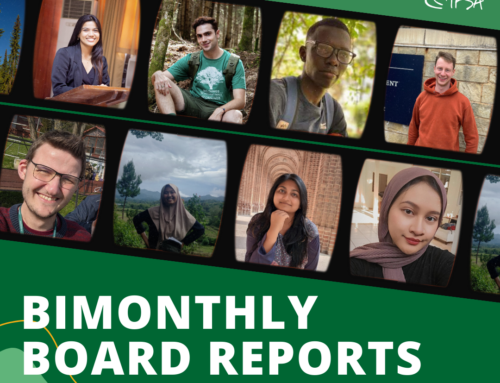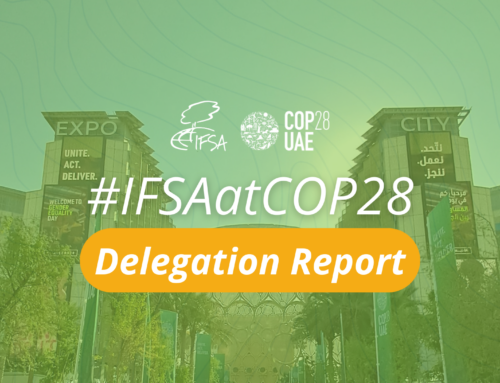Text and picture by Mahtuf Ikhsan (Indonesia) Forests play an important role in how we combine our actions in harmony with the balance of nature, a relationship that is threatened through increasing levels of deforestation, thus making it one of the most popular issues of the new millennium. In order to raise awareness on this global issue at the local level, Student Executive Board of Faculty of Forestry, Bogor Agricultural University, Indonesia created an event called “Semarak Kehutanan”, which means the “The Spirit of Forestry” in English. The event was held on the 14th of November, 2016 at Sylva Pertamina in the university auditorium and was attended by approximately 200 participants. This event specialized on the role of urban forests in the future, addressing both the role of academia and the government as policy maker. Professor Hadi Susilo Arifin (Landscape Architecture Department) and Rachmad Hermawan, PhD (Forest Resources Conservation and Ecotourism) from Bogor Agricultural University started the event off by providing an overview of urban forestry from a research and science perspective. Professor Hadi Susilo Arifin explained the value, characteristics of trees, benefits and distribution of urban forests in Bogor city. He also told us about the standard requirements of urban forests in a province and how we can participate as citizens to help the expansion of urban forests. Mr Rachmad Hermawan further pointed out the relation between science and development of technical skill to build healthy forests in the city. After the first session of “Perspective of Urban Forestry from Academia” was finished, there were many questions from participants. Ms. Sari from Faculty of Forestry, IPB asked how public regulations such as RTRW (Spatial Planning Regulatory) can provide encouragement to build green areas around the city of Bogor, given that the current planning approach taken to bring about urban development is very much focused around economic aspects. Professor Hadi answered that more steps are taken towards creating green spaces in the city. The government seems to realize the dangers associated to global warming and is thus taking steps towards more environmentally friendly solutions. Mr. Rahman from Common First Year Program asked about how we can motivate ourselves to be active in protecting the nature and environment? Professor Rachmad stated that effective action can even start at a student’s dorm. An easy step is to switch off lamps to save energy when there is enough natural light available. This can be a first, small contribution to save the planet. In the second session, the event moved towards the policy perspective, with guest speaker Mrs. Liliek Sukartini (head of the environmental agency of Bogor city). Mrs. Liliek explained how the recent policy of the local government supports urban forestry and how it is implemented. Besides that, she also presented examples of urban forests in Bogor city, like Bogor Botanical Garden, Bambang Organic Forest in Megamendung, CIFOR Educational Forest and trees along the big streets in Bogor. She further encouraged students and the university to develop innovative measures that help bridge the gap between expanding the urban forest and local needs for housing and industry. Finally, Mrs. Liliek emphasized the importance of support from central government bodies like The Ministry of Forestry and Environment to make a strong policy about green land use planning and city development The second session was followed by a dynamic discussion. Mrs. Ita from Bogor Botanical Garden asked about the real contribution from the government to strengthen the policy about green space in the city, taking into account that Bogor city now is very crowded with vehicles and new housing everywhere. Mrs. Liliek explained that the government is still working on the formulation of an action plan to add more green space and urban gardens in Bogor city, while strengthening existing initiatives. Mrs Ita refuted that agricultural land in Bogor city is still decreasing, so what real evidence can the government give that it is working on these issues? Mrs. Liliek said that in 2017 a regulation about land use planning in Bogor will be made. From this event, we learned that urban forests have many challenging aspects. We see that, despite the many benefits that urban forests bring for our earth, aspects of regulation and policy about urban forest remain unclear. We hope that all stakeholders like academia, government and citizens of the city can work together to formulate the best recommendation for this challenging issue in the 21st century. In this event, we saw a lot of participants are very motivated and enthusiastic to know more about the implementation of urban forestry in the future. Speakers and participants shared their ideas, energy and recommendations with each other. The event has further demonstrated that urban forestry creates a host of opportunities for innovation and development of creative solutions for green and sustainable cities. The author, Mahtuf Ikhsa, is a student in the Common First Year Program at Bogor Agricultural University]]>
About the Author: Simone Massaro
Head of Web Subcommission 2018-2020




